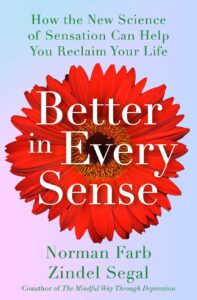SESSIONS EVERY WEEKDAY

Guest Speakers: Norman Farb and Zindel Segal – Better in Every Sense
Evening Event
Description
Neuroscientist Dr. Norman Farb and clinical psychologist Dr. Zindel Segal will be discussing how mental routines confine us to a lack-lustre ‘House of Habit’ and how the emerging neuroscience of sensation provides a solution.
They reveal how, by tuning into new and everyday sensations, we can engage our sensory network and boost our resilience, well-being, health and creativity.
Grounded in decades of scientific research and filled with simple exercises and practical mental techniques, their new publication Better in Every Sense explores how we can successfully negotiate life’s challenges.
Publication Reviews
A brilliant, user-friendly, and easy-to-implement framework explaining why intentionally tuning in to our senses and learning how to trust them and expand their repertoire in outside-the-box ways-what the authors call ‘sense foraging’-is profoundly liberative and healing, revolutionary, and yet totally commonsensical. – Jon Kabat-Zinn
When you are feeling stressed or stuck, how do you relate to your life? In Better in Every Sense the authors take us through the science of tools to get out of the ‘house of habit’ and offer ways to re-engage with your life. A wonderful new book by Norman Farb and Zindel Segal. Fascinating, thought-provoking, and so useful in these trying times. – Sharon Salzberg, author of Lovingkindness and Real Life
These two highly trained and highly skilled professionals have got the chops – and the goods – to help you genuinely upgrade your life! – Dan Harris, author of 10% Happier

View the publication:
Published in the US by Little, Brown Spark: https://betterineverysense.com/the-book/
Published in the UK by Yellow Kite Books: https://www.yellowkitebooks.co.uk/titles/norman-farb/better-in-every-sense/9781399708166/
What will I do on this course?
It will comprise an informative talk and may include light mindfulness practice.Learning Outcomes
This session provides an opportunity to learn more about Sense Foraging, tuning into sensations and enhancing resilience, well-being, health and creativity.About the Teachers

Norman Farb
Norman Farb is an Associate Professor of Psychology at the University of Toronto Mississauga, where he directs the Regulatory and Affective Dynamics laboratory (www.radlab.zone), and a fellow at the Mind and Life Institute. He studies the social neuroscience of the self and human emotion, with a focus on how biases in self-representation shape emotional reactions that determine well-being and mental habits, such as how we think about ourselves and our emotions. He is particularly interested in how cognitive training practices such as mindfulness meditation foster resilience against stress, reducing vulnerability to disorders such as depression. Dr. Farb’s work draws from multiple levels of analysis, including first and third-person qualitative reports, behavioral task performance, physiological responses, and patterns of neural activity and connectivity derived through functional MRI. He has written some of the most cited neuroscience accounts of mindfulness training, and is currently exploring how to expand access to these techniques to promote wellbeing across the globe.

Zindel Segal
Dr. Zindel Segal is the Distinguished Professor of Psychology in Mood Disorders at the University of Toronto Scarborough and a Senior Scientist in the Campbell Family Mental Health Research Institute at the Centre for Addiction and Mental Health. His research has helped to characterize psychological markers of relapse vulnerability to affective disorder. Among the books he has authored are Interpersonal Process in Cognitive Therapy, Cognitive Vulnerability to Depression, and Mindfulness-Based Cognitive Therapy for Depression: A new approach for preventing relapse. Awarded the Douglas Utting Prize for significant contributions to the understanding and treatment of depression and the Hope Award by the Mood Disorders Association of Ontario, he continues to advocate for the relevance of mindfulness-based clinical care in psychiatry and mental health.